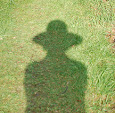
After spending the day watching men working on log booms with their long poles manouevring them into position, a word from long ago popped into my head.

I started: "The answer is 'Pickaroon'."
Neither crew nor passengers had ever heard the word! Nothing in the dictionary.... But I knew for certain that I knew it and I thought it was the long (ish) pole that loggers used to work, indeed, roll, the logs when walking along them within the boom.
Wrong ...

Over the weeks I continued to ask locals about the word. "No. Never heard of it." Then over dinner with my brother he put me right. Yes, he knew the word and yes, my father had used one (and that's how I came to have it in my file of useless information!)
First of all, a pickaroon is a tool which looks like an axe but has a special head on it. It is a one-piece head with a 5" hook and 34" handle and used by loggers, millworkers, rail workers to manoeuvre logs on land.
First of all, a pickaroon is a tool which looks like an axe but has a special head on it. It is a one-piece head with a 5" hook and 34" handle and used by loggers, millworkers, rail workers to manoeuvre logs on land.
 This photo is from here.
This photo is from here.So why would I possibly have that word in my vocabulary?! I was reminded by my brother that my father, who started a haulage business in central B.C. in the 1940s, used to store (and deliver) big blocks of ice. This is when people used 'ice-boxes' for keeping food cool. I used to play in the ice house where these blocks were piled and where the Federated Co-op Mill (at Canoe) shavings were used to insulate the layers. A pickaroon was what he used to work with the ice blocks just as a railway worker used the same tool to work with railway ties.
So that is the story.
So that is the story.
For the record: the tool normally used by workers on log booms is a peavey. (Observation: everyone is familiar with that word.) Also, a cant hook is like a peavey but has a toe-ring at the end instead of a pike. (Photo showing both is here)
A real bit of trivia from a fun game!




No comments:
Post a Comment